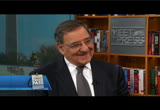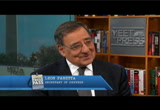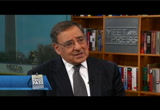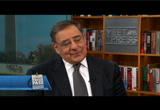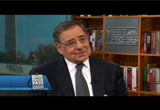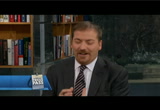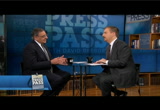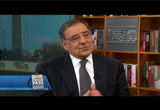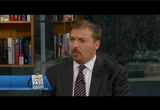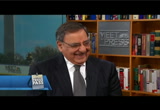tv Meet the Presss Press Pass NBC February 3, 2013 11:30am-11:45am EST
11:31 am
i'm chuck todd in for david gregory. and this is press pass, your all access pass to an extra meet the press conversation. we just heard from leon panetta and martin demp dempsey. i'm joined again now by leon panetta. as he leaves government service, we thought we'd get his personal reflection on what is an extraordinary career spanning over 40 years. secretary panetta, thanks for taking a little extra time with us. let me go through this resume. let's see, first lieutenant in the army. do you want me to say the years
11:32 am
or not? the first head of the nixon administration's office of civil rights. i brought you a clip to show you on the day that you were ceremony -- unceremoniously asked to leave perhaps. we have the old photo of you there. then you went and ran for congress. served in congress for over a decade. bill clinton's first budget director. his chief of staff. you left for a while. they almost got you to run for governor i think of california. then cia director and then secretary of defense. it is you, jim baker, donald rumsfeld, dick cheney, you're on this mount rushmore of guys that have held every office other than the president. >> it's been a hell of a ride. i really enjoyed it. in many ways. you know, it's kind of the son of italian immigrants i've kind of lived the american dream, which is i've gotten a lot of opportunities to serve the country. and i've been able to do some great things. i really, you know, in the end i
11:33 am
used to ask my father why as an immigrant he came to the united states. he said because we wanted to make sure our children had a better life. i hope that that's my legacy that in some way in all those jobs i gave our children a better life. >> i want to ask you a little about all of it, but i want to start with we've now had back-to-back secretary of defense that did a stint as head of the cia. how important was that stint? having that experience at the cia, how does -- how are future secretary of defenses -- what are they missing by not knowing how the cia works? >> well, it gave me -- there's no question it gave both bob gates and i i think a tremendous advantage. because when you're looking at the intelligence side and looking at the threats and looking at who's out there is a threat to the united states and the whole process that's involved in gathering that kind of information, that becomes very important when you go to defense because everything you do with defense depends on good intelligence. and there you not only get the
11:34 am
intelligence, but you then have to do the operational stuff to make sure we're protecting the country. so having that combined experience i thought was very helpful to me as secretary of defense. >> you know, you've also been in this unique position, the drone program, the expansion of the drone program. you ran it in some form the operational aspect of it at the cia. do you run actually -- are you in charge of less of the drone operation at the defense department than at the cia? >> not really. we're the ones who supply the cia with the use. >> who makes the call? >> it depends on the operations. the best thing i've seen happen in the four years that i've been back here is we really have a very good military and intelligence partnership now with regards to going after al qaeda. and there are operations that we've developed in which, you know, we developed the targets and then we make the decision who's best able to be able to go after those targets. and it's a very synchronized good operation that gives us the best of both military and the
11:35 am
intelligence. >> this issue though of the drones is something -- we don't have a big debate about it in the united states. it is the new cover of "time" magazine. but retired general now mcchrystal -- a man strikes much greater than the average american appreciates. they are hated on a visceral level even by people who have never seen one or seen the effects of one." have we opened a pandora's box we may regret in 20 years? >> as always i think the united states has to always pay attention to these issues and make sure that, you know, that we're applying the right standards abiding by the laws of this country. but in the end also using what we have to use against the enemies of the united states. i mean, after all in 9/11 al qaeda attacked us in a brutal way that killed, you know, 3,000
11:36 am
innocent people in our trade center and killed almost 200 people at the pentagon as well as those in pennsylvania. it was a deliberate act of terrorism. we went to war. and when you go to war and you have an enemy out there, you've got to use everything you can to make sure you go after that enemy. and that's what we did. and the fact is we had very precise effective operations to go right at al qaeda's leadership. and by weakening them and by significantly impacting them especially with the bin laden raid the fact is we are safer today from that 9/11-type attack. >> there seems to be some concern even the president did an interview with mark bouden and said there's a remoteness to it that makes it tempting that somehow we can without any mess on our hands solve vexing security problems. it's the morale -- >> you know, as a catholic i remember when i first became
11:37 am
director of the cia and realized that i was making life and death decisions with regards to our operations. it doesn't come lightly. you've got to really think about it. you've got to make sure that we really are focused on somebody who is, you know, a direct threat to the united states. someone who intends to attack the united states. and hurt our people. and you've got to be able to go through the process. and it was an intricate process. not only of establishing the targets, but going through the legal requirements to ensure that we were doing this carefully. and then also then the operational side to make sure we limited the collateral damage. >> the transparency on this is very limited. does that need to change? does there need to be more oversight? >> i think the way to do it frankly is that, you know, in title 10 operations, which are the military operations, i think a lot more of this can be put under title 10 and that on title
11:38 am
50 we always ought to have that capability to use a covert effort if we have to. >> very limited. >> i would limit that and move -- >> and there's more oversight at the pentagon essentially as your job you should be in charge of the secretary of defense more so than -- >> i think the advantage is it becomes much more transparent. >> let me ask you about the balance between the so-called what eisenhower calls the military and balance of power between civilian and military control. we talk about the economy and how it's so dependent suddenly on the defense industry. how do you know if we have the right balance? how do you know if it's out of whack? is it out of whack? >> you have to look whether or not there's really a team effort in which the military and civilian workforce are coming together to determine what the policies ought to be and the strategy ought to be. when that's happening and i've had the advantage of that happening during the time i've been secretary, that's the way it ought to work. >> and we're going to take a quick break and be right back
11:40 am
(woman) 3 days of walking to give a break cancer survivor a lifetime-- that's definitely a fair trade. it was sucha beautifu. (jessica lee) ♪ and it's beautiful (woman) why walk 60 miles in the boldest breast cancer event in history? because your efforts help komen serve millions of women and men facing breast cancer every year. visit the3day.org to register or to request more information today. it was 3 days of pure joy. ♪ and it's beautiful
11:41 am
and we're back with more from defense secretary leon panetta as he looks back on his career in washington. as a former white house chief of staff, i've always heard rumors at cia when running through something as chief of staff you might have had some advice for him. what's your advice to the new white house chief of staff in a
11:42 am
second term? you've had to deal with sort of a tumultuous republican congress when you were chief of staff for bill clinton. >> the most importanthing is obviously to maintain the trust of your boss. you can't be a good chief of staff unless you have the trust of your boss. and that means more than just, you know, taking directions from him. you've got to be able to tell him truthfully what's going on, what mistakes he's making, what he should be doing. it's got to be a trustful relationship. that's important. >> do you think dennis has that? >> i think he does. >> being able to tell the president, no, bad idea. >> i think he does. i really do. >> what's your advice to dennis on how to deal with congress? >> i think you got to do a lot of outreach to congress. i had hill experience when i was chief of staff and that gave me an advantage. and i think it's important that you've got to reach out to congress. they've got to know you. they've got to be able to trust you too that as chief of staff you're going to be willing to take their messages and convey them to the president. that's the kind of relationship he's going to have to develop.
11:43 am
>> this wouldn't be "meet the press" if we didn't go back to something you said way back when. in 1989 you came on "meet the press" and talked about the political log jam, ten years of problems with the budget. let me play the bite. >> yeah. >> let's hear what you had to say. >> you want to actually achieve strong deficit reduction in this country. we have known for the last eight years that you've got to make tough choices on defense, on entitlements and on taxes. the problem we've had in this town for the last ten years now is a political log jam. one party saying you can't cut defense and you can't raise taxes and the other saying you can't touch entitlements. until both sides are willing to put everything on the table and make those tough choices, we're going to continue to play games. that's the problem in this town right now. >> first of all, you've held up pretty well. >> that's a very thoughtful guy. i'm with him. >> this is 1989. i'll take the republican president, we had a democratic house, democratic senate. >> there's your issues. >> same political log jam. >> exactly.
11:44 am
>> so nothing changes or maybe should we actually feel more optimistic? >> i'll tell you, the difference was ultimately at that time the leadership on both democratic and republican sides came together to develop some very important budget agreements that ultimately balanced the budget and created a surplus. what has to happen is we've got to go back to that same dynamic where the leadership is willing to say to the members you have got to sit down in a room and develop the kind of comprehensive package to resolve this fiscal crisis. >> what's your advice to the president? what should he do more of? he gets a little defensive when people criticize you're not reaching out, he says i've reached out a lot. they're not reaching out to me. >> he's got to continue to speak to the american people about the importance of developing the kind of package that will resolve this fiscal crisis. >> don't reach out to congress as much? >> you got to continue to talk to the congress. you always have to work with them as closely as you can. but frankly they
113 Views
IN COLLECTIONS
WRC (NBC) Television Archive
Television Archive  Television Archive News Search Service
Television Archive News Search Service 
Uploaded by TV Archive on

 Live Music Archive
Live Music Archive Librivox Free Audio
Librivox Free Audio Metropolitan Museum
Metropolitan Museum Cleveland Museum of Art
Cleveland Museum of Art Internet Arcade
Internet Arcade Console Living Room
Console Living Room Books to Borrow
Books to Borrow Open Library
Open Library TV News
TV News Understanding 9/11
Understanding 9/11

